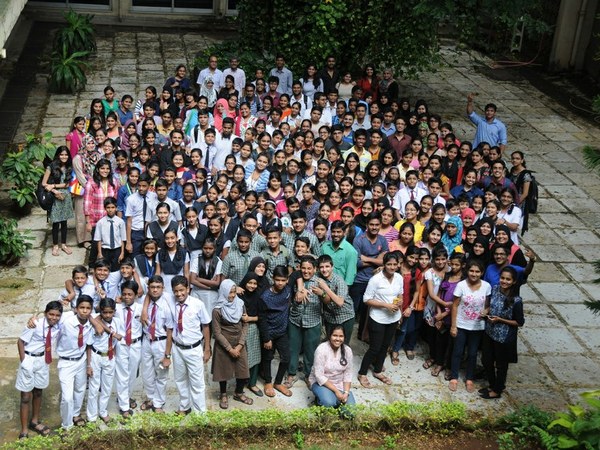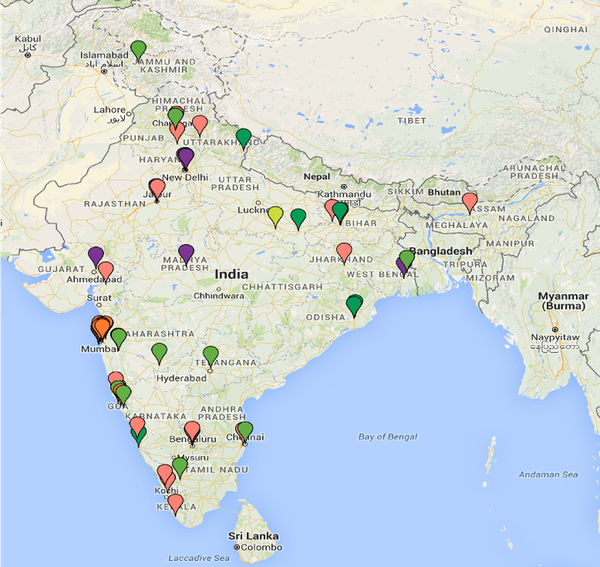Collaboratively Understanding Biology Education (CUBE)
"Education should not be something we (teachers) do to our students, it should be something we do in collaboration with our Students." Brewer C.A. & Smith D. (2011)
Science as Culture
An alternative paradigm of science education to expand the participatory base of science in the country. CUBE engages students from KG to PG with activities, experiments, field work, meetings, presentations, online discussions etc. to inculcate science as a culture, an ongoing close-to-life practice.
This is an inclusive program open to all irrespective of your background, experience, graduation or grades. It is best captured by one of our slogans: "Weak, Meek and Geek all are Welcome!".
We believe in Obaid Siddiqi's inspiring thoughts: "Sophistication is required in the mind, not in the laboratories".
CUBE is an initiative of the Gnowledge Lab of HBCSE (Homi Bhabha Centre for Science Education), a national centre of TIFR (Tata Institute of Fundamental Research).
CUBE Website |
Register on CUBE Mailing List |
Register on MetaStudio.org |
CUBE Winter Meet, 22 January 2017, HBCSE, Mumbai. College students from Elphinstone, KBP, VES, CHM, Ruia, D Y Patil; and school students from Adarsh Vidyalaya, Chembur Naka School, Deonar Colony School.

CUBE Conference held on 7th August 2016 was the most recent mega-event organized by CUBE. It was attended by around 230 participants of which some are seen in the group photo above. As we can notice more and more students from schools are participating actively. Vertical integration of schools , colleges and research centers through collaboration is one of the design principles of CUBE project.

Pagalapos (a pun on Darwin's Galapagos islands) is a popular activity across the country that attracts students. Students collecting microbial samples (figure above) from the 'pagalapos islands' of Sophia College Campus. South Mumbai. Cubists (as participants of the CUBE program call themselves) study how microbes (ciliates, rotifers, nematodes, algae, bacteria etc.) revive from dry sample of soil (during summer months) in a matter of an hour or two. Isolation of these microbes in cultures from these door-step ecosystems offers great opportunity for developing new model systems for further research on protozoans, nematodes,algae, rotifers etc. for further experimental studies. An ordinary microscope and a mobile camera can do wonders! Performing experiments with easily accessible resources is another design principle of CUBE's intervention.


CUBE conference held on 7th August 2016 attracted participation from schools and colleges. Invitees from Cube centers of Delhi, Chennai and Pune were present, too. CUBE holds four such conferences every year in Mumbai alone, to review the work done by the students. Other CUBE hubs too hold regional conferences. In the picture, above, undergraduate, postgraduate and school students occupy the same stage. School students often contribute model organisms from their neighbourhood for experiments jointly done by them along with undergraduate/postgraduate students and teachers. They are also in close collaboration with scientists from across the world through mailing groups.

Cardamine hirsuta a member of the mustard family grows as a weed in the HBCSE,TIFR garden ( Mumbai). Its short life span of less than 8 weeks makes it an ideal model system for biological investigations. One of the design principle of CUBE is to use easily available model organisms from the immediate environment where students study and live. CUBE participants are destined to create protocols to maintain such hither to unnoticed models like Cardamine hirsuta as a 'table-top farm' for research and education.

Several CUBE nodes are getting formed across India. CUBE network is expanding organically by creating a network of functional laboratories of schools and colleges. It is estimated that there are more than 25,000 undergraduate college teaching science and about 1.3 million schools in the country. The picture above is where we are now. And we do intend to demonstrate that CUBE model has the potential to impact the entire country. It does not cost the participating organizations any resource except their time.
Participating students and teachers share what they do, seek feedback and help in the CUBE Mailing list (link given below).